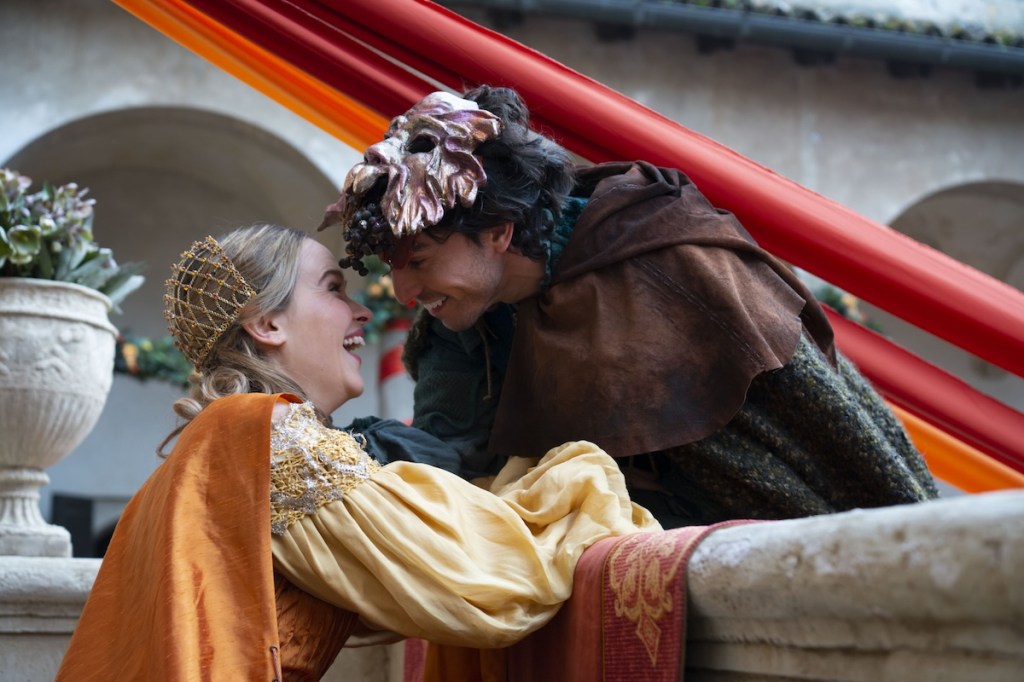It seems there’s never been a period so saturated with “Romeo and Juliet” adaptations as today. Although more than two decades have passed since Baz Luhrmann released his modern retelling set to an alternative pop soundtrack titled “William Shakespeare’s Romeo + Juliet,” the timeless drama continues to inspire fresh interpretations. In recent times, we’ve enjoyed movies such as 2021’s “R#J”, filmed akin to a social-media-found footage narrative, and 2022’s “Rosaline,” where a minor role was elevated to center stage alongside the tragic love story. Additionally, last year brought us both a pared-down production headlined by Tom Holland and another adaptation earning a Tony nomination for its original score composed by Jack Antonoff.
Nevertheless, merely having impeccable source material does not guarantee that every adaptation will be of high quality or leave a lasting impression. Unfortunately, “Juliet & Romeo” falls into this category. Writer-director Timothy Scott Bogart (“Spinning Gold”), attempts to revitalize the ancient narrative by transforming it into a star-filled musical featuring modern pop tunes instead of maintaining Shakespeare’s distinctive style, character depth, and emotional resonance. Lacking proper development, weakly executed, and lacking standout musical sequences that would engage viewers enough to move their feet, this wannabe version inspired by “La La Land” fails to do justice to Shakespeare’s tale, ultimately causing frustration and boredom among audiences.
In the opening scenes, set in Verona around 1301, we encounter a fragile truce between two feuding clans—the Montagues led by Lord Montague (played by Jason Isaacs) and the Capulets headed by Lord and Lady Capulet portrayed by Rupert Everett and Rebel Wilson respectively. Upon returning from boarding school, Juliet (portrayed by Clara Rugaard), the Capulets’ daughter, causes concern for her cousin and close companion Rosaline (acted by Tayla Parx), who cryptically hints at an approaching issue that could impact Juliet’s life.
Meanwhile, within the Montague household, tensions run high due to internal conflicts;Mercutio (Nicholas Podany), seeking validation from his adoptive father, finds solace in a relationship with Veronica (Martina Ortiz Luis), a woman of humble origins. Additionally, Romeo (Jamie Ward), their natural-born child, often rebels against authority figures.
The chance comes when Romeo and Juliet bump into each other at the nighttime bazaar under the glow of the full moon—both unaware of the other’s identity, even as they wear emblems representing their families’ rival gangs. It takes them some time before they realize whom they’ve fallen for, but by then, they’re already head over heels, sharing kisses in hidden alleys and atop church benches, and sneaking around beneath the city in the labyrinthine tunnels. However, fate intervenes during Lord Paris’s (played by Dennis Andres) appearance at Juliet’s parents’ gathering, leading to conflict with her quick-to-fight relative Tybalt (portrayed by Ferdia Walsh-Peelo). All that remains for this star-crossed pair is to pray that Friar Lawrence (acted by Derek Jacobi) and the Apothecary (interpreted by Dan Fogler) come up with a plan to save them from ruin.
The amateurish operation is frustrating from the start, seeking to mimic a storybook fantasy by using turning-page graphics and exposition-dump narration to bookend the film. The score feels synthetic and ever-present. Set-pieces that utilize original pop songs written by Bogart’s brother Evan Kidd Bogart and Justin Gray fail to inspire whimsy, imagination or awe-inducing delight. These sequences are cut to bits – and not in a music video style – masking the choreography and blunting the emotional impact. However, it’s admittedly cute when the lovers sing about falling in love while literally taking the plunge into a cart full of hay.
In terms of storytelling, Bogart rearranges the sequence of events by depicting the couple getting married before attending the Capulet Ball, and he alters the ending in a predictable manner solely for potential sequels. Additionally, he includes extra musical segments for characters who do not necessarily require an elaborate song, yet due to their status, they are presumed to deserve one. This disrupts the pacing and overall atmosphere. However, consider the backlash had Fogler been denied a flamboyant tune in his lab or Wilson lacked a sentimental feminist ballad to perform in a castle.
Effective character growth is notably absent for characters besides Romeo, Juliet, and Mercutio. Bogart revises the script, adding some choice lines from the original play, yet perplexingly fails to provide substantial inner or outer motivations for secondary roles such as Rosaline, Juliet’s Nurse (played by Sara Lazzaro), Versante (portrayed by Ledsi), and several members of Romeo’s team. Consequently, when these actors start singing during the disjointedly edited musical sequences and gaze upward, viewers may be puzzled about the purpose behind including them in the ensemble.
Fortunately, this recycled product doesn’t suffer from numerous flaws. The use of genuine Italian settings adds significant appeal to the movie. Despite the actors seemingly mimicking prerecorded music, their visible breath during emotional musical scenes inside historically accurate set pieces enhances their portrayals convincingly. Dante Ferretti’s impeccable production design effectively transports viewers back in time. Rugaard and Ward exhibit a tender, innocent connection that captivates at every opportunity. Furthermore, Podany imbues complexity and nuance into his character’s development.
A superior take on Bogart’s interpretation remains available, awaiting full realization—a rendition that would blend powerful new music with Shakespeare’s narrative. Given the recent influx of adaptations, this enhanced version could emerge sooner rather than later. In the meantime, for those seeking depth and satisfaction from our current choices, revisiting Luhrmann’s extravagant production offers a rewarding experience.
More from Efwebe
- Jim Sheridan Biography Film Featuring U2 Music in Development Under ‘Spinning Gold’ Director (EXCLUSIVE)
- EMMYS: The Reason Certain Legendary Performances Fail to Claim an Award
